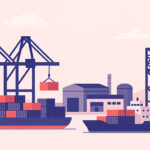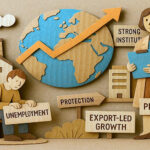Posted on Aug 3, 2025 in Auctions & Assets, Global Trade & Banking
How Countries Use Auctions to Sell Precious Assets
Governments around the world regularly turn to auctions as a mechanism to raise capital, restructure finances, or redistribute resources. Instead of negotiating behind closed doors, auctions create the appearance of transparency and allow states to capture maximum value through competition. What makes these auctions particularly important is the type of assets involved: gold reserves, energy contracts, mineral rights, and even infrastructure licenses. Each transaction has ripple effects for credit systems, investment strategies, and international trade. Understanding how these auctions function explains why they have become central tools in global finance, not only as revenue-raising instruments but also as signals of fiscal strength and openness to markets.
Read More »
Posted on Jul 8, 2025 in Global Trade & Banking
Financing Marine Transportation: The Role Of Banks In Global Trade
Every year, millions of containers cross oceans carrying food, fuel, and manufactured goods. Behind this seamless movement lies one of the world’s most capital-intensive industries: shipping. A single vessel costs more than most small businesses could ever dream of financing. That is where banks come in. They provide the loans, guarantees, and credit lines that allow ships to be built, fleets to expand, and global supply chains to keep functioning. Understanding how banks interact with marine transportation reveals just how central finance is to international commerce—and why ships can’t sail without it.
Read More »
Posted on Mar 1, 2025 in Global Trade & Banking, Policy & Regulation
The Impact of Globalization on Unemployment Rates
Globalization is often described as the defining economic trend of the last fifty years. It has integrated markets, created massive flows of goods and services, and shifted entire industries across borders. But while globalization has opened opportunities, it has also complicated job markets worldwide. Some regions have enjoyed a surge in employment as factories and service centers expanded, while others have struggled with rising unemployment due to outsourcing and offshoring. The impact is rarely uniform. It depends on industry structures, government policies, and how adaptable workers are to new demands. Understanding the connection between globalization and unemployment requires looking beyond broad trends to examine how trade, outsourcing, and policy choices interact to shape employment outcomes.
Read More »

























